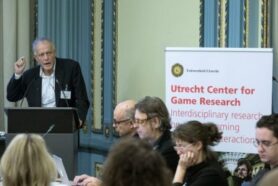Symposium: EcoGames 2017 – Game Research Meets Sustainability
Time: 30th January 2017 (9.15-17.15)
Location: Sweelinckzaal, Drift 21, 3512 BR Utrecht
On January 30th, 2017, the Utrecht Focus Area and Center for Game Research organized a symposium on EcoGames, i.e. games with a focus on ecosystems and sustainability, which constitute imaginative spaces for playing and learning, express often contested moral and political values, and raise awareness of a variety of sustainability issues, such as renewable energy transitions, circular economies, sustainable mobility, as well as green water use and energy consumption.
This symposium brought together experts in the fields of game design and research, communication, media and urban studies, ethics, geosciences, data and computer science. It explores the psychological, social, cultural and institutional conditions of a transition to a sustainable society, and the role ecogames could play in such a transition.
A short report on the event, including several important points of discussion as well as photographic material, can be found here.
Key Speakers
The full program of the symposium is archived here. Below, the four key speakers and their topics are briefly summarized.
 The Centre for the Humanities is the platform for interdisciplinary and interfaculty dialogue at Utrecht University. It functions as a critical think-tank on academic knowledge and the social relevance and the value of the Humanities in the contemporary world. CfH is a flexible and fast-moving instrument that is capable of mobilising human and material resources to address urgent contemporary questions. Therefore, CfH provides quick and timely interventions in the public debate, through a number of concrete target-oriented activities.
The Centre for the Humanities is the platform for interdisciplinary and interfaculty dialogue at Utrecht University. It functions as a critical think-tank on academic knowledge and the social relevance and the value of the Humanities in the contemporary world. CfH is a flexible and fast-moving instrument that is capable of mobilising human and material resources to address urgent contemporary questions. Therefore, CfH provides quick and timely interventions in the public debate, through a number of concrete target-oriented activities.
Wiljan van den Akker is Vice-rector for Research and Director of the Centre for the Humanities, Utrecht University.
 Climate change and other ecological challenges are forming a challenge for nearly all dimensions of our life. Possible solutions to those challenges can affect the structure of political institutions, the form of social relationships, the legal order and moral convictions. An ethical assessment of the possible changes presupposes awareness of the different possibilities a sustainable world could like. The ethics of climate change therefore necessarily presuppose imaginative sources to figure out how the future world could look like. The presentation will try to understand the importance of imagination for the ethical debate.
Climate change and other ecological challenges are forming a challenge for nearly all dimensions of our life. Possible solutions to those challenges can affect the structure of political institutions, the form of social relationships, the legal order and moral convictions. An ethical assessment of the possible changes presupposes awareness of the different possibilities a sustainable world could like. The ethics of climate change therefore necessarily presuppose imaginative sources to figure out how the future world could look like. The presentation will try to understand the importance of imagination for the ethical debate.
Marcus Düwell holds a chair for philosophical ethics at Utrecht University.
 Do cities merely evolve? Or are there ways in which our present behaviour can influence our urban futures? Is there, perhaps, even a way in which the past predetermines the routes taken? In his contribution Maarten Hajer explores the role of the imagination in urban futures in past and present.
Do cities merely evolve? Or are there ways in which our present behaviour can influence our urban futures? Is there, perhaps, even a way in which the past predetermines the routes taken? In his contribution Maarten Hajer explores the role of the imagination in urban futures in past and present.
Maarten Hajer is distinguished professor Urban Futures at Utrecht University.
 Naratives can influence people’s beliefs, attitudes, and behavior. An important driver of these effects is the extent to which an audience cares about a character’s wellbeing and values the character’s goals. Hans Hoeken discussed research showing that this type of character involvement can yield more intense emotions and have people adopt opinions and attitudes expressed by that character. Hoeken also talked about research on what factors lead to becoming involved with a character.
Naratives can influence people’s beliefs, attitudes, and behavior. An important driver of these effects is the extent to which an audience cares about a character’s wellbeing and values the character’s goals. Hans Hoeken discussed research showing that this type of character involvement can yield more intense emotions and have people adopt opinions and attitudes expressed by that character. Hoeken also talked about research on what factors lead to becoming involved with a character.
Hans Hoeken holds the chair of Communication & Information Studies at Utrecht University.


